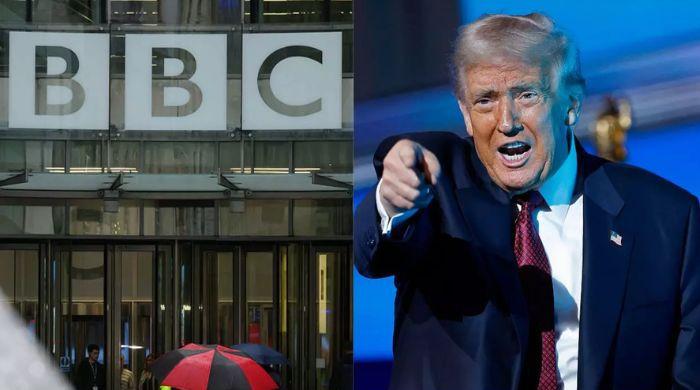US President Donald Trump, vowing to sue the British Broadcasting Corporation (BBC) for “anything between $1 billion and $5 billion” over a misleadingly edited clip in a Panorama documentary, faces a steep uphill battle in court, with legal analysts pointing to a range of formidable jurisdictions and legal hurdles.
“We have to do it, they’ve even admitted they cheated, not that they couldn’t have. They cheated. They changed the words that came out of my mouth,” President Trump told reporters aboard Air Force One.
BBC also issued a formal apology last week for an edit in an October 2024 documentary that spliced together two parts of the president’s Jan. 6, 2021 speech.
With the edited version, there was a “false impression” that he was directly calling for an act of violence.
While the apology led to the resignation of the company’s two top executives, the news agency has refused to pay financial compensation, citing that it “strongly disagreed that there is any basis for defamation claims”, as reported by Sky News.
Despite BBCLegal experts suggest a successful lawsuit is a long shot.
Legal hurdles in the UK
The most straightforward route to bring a defamation case would be in the UK, as the program originally aired here. But this road seems to be closed.
The one-year statute of limitations for a defamation claim in the UK will almost certainly have expired when the program aired in October 2024. But even if it hadn’t, President Trump would face the difficult task of proving serious damage to his reputation, a key requirement under UK law.
It is expected BBC‘s defense would be that the editing was an error of judgement, not malicious, and that Trump was re-elected president shortly after the documentary aired and suffered no appreciable reputational damage in Britain as a result.
Legal Obstacles in the United States
The other way is to take the case to a US court, potentially in Trump’s home state of Florida, which introduces a different set of challenges, mainly regarding jurisdiction and the high bar for public figures to prove defamation.
The biggest problem Trump will face is that BBC‘s Panorama program was not broadcast on any US television and was geographically restricted on the BBC’s iPlayer platform.
To sue in Florida, Trump’s legal team must convince the court that it does BBC purposefully aimed its content at a Florida audience, which seems like a difficult argument to make.
If a court accepts jurisdiction, the U.S. president would have to meet the “actual malice” standard set by the U.S. Supreme Court in New York Times Co. v. Sullivan.
Since BBC has already stated that the editing was “unintentional” in its formal apology, writing back, “We accept that our editing inadvertently created the impression that we showed a single continuous section of the speech, rather than excerpts from different points in the speech, and this gave the false impression that President Trump had made a direct call for violent action.”
This statement directly contradicts the “actual malice” standard.
A political quagmire for the UK Prime Minister
The situation also created a diplomatic and political dilemma for British Prime Minister Keir Starmer.
Trump told reporters he plans to have a phone conversation with Starmer over the weekend.
Since BBC is a public corporation, funded by a license fee and legally independent from the government, Starmer is intervening to dissuade Trump from the lawsuit, may accuse him of compromising BBCeditorial independence.
If he remains silent, he leaves a beloved British institution facing a potentially costly and protracted legal battle with a sitting US president, one that could ultimately be funded by British taxpayers.
In a separate interview on Saturday, Nov. 15, recorded before his comments on Air Force One, Trump declared the lawsuit an “obligation,” adding, “If you don’t do it, you don’t prevent it from happening again to other people.
However, the legal path to a multibillion-dollar payout is fraught with complications that could make the threat of a lawsuit more potent than its eventual filing.



